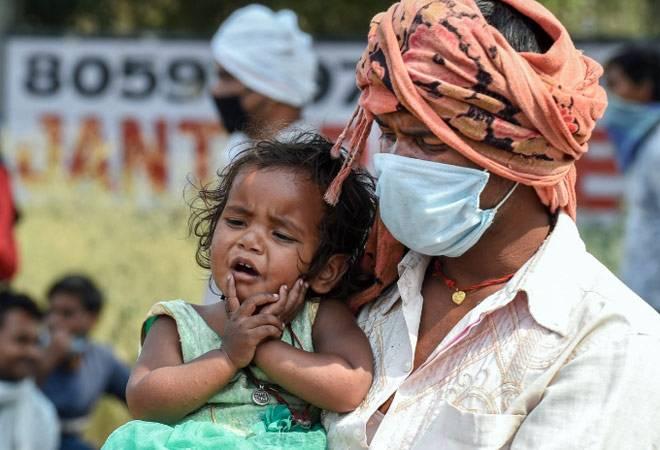Truth Behind India’s Hierarchies of Pain

Migrants wait for a means of transport to travel to their native places during the fourth phase of the ongoing COVID-19 nationwide lockdown, at Kundali Industrial Area in Sonipat. (Photo: PTI)
The killing of a pregnant elephant has caused national outrage. The elephant had strayed into a village in Palakkad, Kerala, and is said to have been fed a fruit stuffed with firecrackers, which exploded in its mouth. It is impossible to comprehend the tremendous suffering of the elephant, who died a painful death. It is also learnt that people in the region have in the past used incendiary materials to protect their crop from animals, particularly wild boar.
One person was arrested after the matter came to light and few others have been identified. Kerala Chief Minister Pinarayi Vijayan has promised “justice will prevail”, but one does not know if that includes legal action against the hatemongers—including a former cabinet minister who gave the incident a communal colour by claiming, incorrectly, that the incident occurred in Muslim-majority Malappuram. A sitting cabinet minister also retweeted this fake news, which further vitiated the atmosphere.
In a complaint to the Malappuram Police, a lawyer has urged the police chief to file an FIR against the former minister and others for a “derogatory” campaign against the district.
Now, many Indian celebrities, for example Indian cricket team captain Virat Kohli, have said that they are “appalled” by the incident. The chairman of India’s biggest corporate giant, Ratan Tata, has compared the “criminal act” with “meditated murder”. The celebrities, the anchors of 24/7 news channels and many other prominent figures are undeniably upset by the plight of the elephant. But do they also feel the same kind of outrage and disquiet over the communal overtones being imparted to it?
Then again, it is sheer coincidence, but on the day they were venting over the elephant, a court in Delhi had denied bail to Safoora Zargar, a 27-year-old Jamia Millia Islamia scholar who suffers from a number of ailments including polycystic ovary syndrome and also happens to be pregnant. Zargar and many other students have been charged with the “crime” of opposing the CAA and NRC. The draconian Unlawful Activities Prevention Act or UAPA has been imposed on them, which leading scholars and activists in India and abroad have been decrying. There have been demands for their immediate release, not least because a pandemic is sweeping the country, and the deadly virus that is causing it has breached the prison system. For instance, inmates in all three of Delhi’s jails are known to have contracted the coronavirus infection.
Surely the celebrities would know that in March the Supreme Court had ordered states to release prisoners to avoid overcrowding in jails during the outbreak of the Covid-19 disease. It had specifically said that those who have been convicted or charged with offences that have a jail term of up to seven years should be released on parole.
Perhaps our celebrities know that talking about the plight of an animal—who died in a state not ruled by the ruling dispensation at the Centre—is a safe bet. They also understand that if they start talking about the pain of human beings who allegedly face depredations due to this dispensation there will be consequences to bear.
Maybe not everybody can be a John Boyega. The British actor and producer, who is best known for playing the character of Finn in the Star Wars trilogy produced in the last decade, recently delivered a passionate address at an anti-racism “Black Lives Matter” demonstration at London. “Look—I don’t know if I’m going to have a career after this, but [redacted] that!” Boyega said at a rally.
It could be argued that Indian celebrities wavered in speaking out against the incarceration of student-activists because the charges levelled against them are serious and the laws invoked are draconian. But then again, these celebs were silent—yes many of them were celebrities then as well—way back in 2002 too, when Kausar Bano was brutalised by Babu Bajrangi and numerous other crimes were perpetrated against the minorities in the Gujarat riots.
Anybody can browse the 45-50 reports brought out by leading national and international human rights organisations and concerned citizens which document the brutal killings and mayhem unleashed at the behest of Hindutva supremacist organisations in the state while the government turned a blind eye. How celebrities reacted to those crimes as well is for all to see. How many of them condemned those killings, rapes, acts of arson and how many of them engaged in welcoming the new “Hriday Samrat” of the majority is public knowledge.
Definitely, celebrities alone cannot be singled out for venting their selective outrage punctuated by long silences. They may pretend to be conscience-keepers of the nation but what they really worry about is their careers, the state of their coffers and of course, state reprisal.
This has become our new normal!
VHP leader Giriraj Kishor had (in)famously said in the early years of this century that the “cow is considered more sacred than human beings in the Puranas”. He can be credited with providing a hint of things to come.
In October 2002, five Dalit men were brutally killed, in the presence of a large mob, outside the Dulina Police Post near Jhajjar town in Haryana while several senior district officials were present. The men had been transporting dead cows and they were accused by the mob of cow slaughter. This and many other spectacle-type killings were a warning of what was to descend on the country twelve years down the line. The grotesque drama in Dulina did not even end with the killing of the men. In fact, the police promptly sent the dead cows for a medical examination and filed cases against the dead Dalits for having “slaughtered” them.
Perhaps it is also time to recall the two-year-old incident in Bulandshahr where a mob, allegedly instigated by Hindutva fanatics, lynched the courageous police officer Subodh Kumar Singh. The mob was apparently agitated because “cow carcasses” had been found in a field.
Yogi Adityanath, the monk-turned-politician and Chief Minister of Uttar Pradesh had displayed tremendous concern over news of the dead bovine. It is on the record that Adityanath had instructed police officials to nab the culprits involved in the alleged cow slaughter. However, the CM was severely criticised by rights activists for not sympathising with the brave police officer who was martyred while defending India’s Constitution against a violent mob. Then, in a few hours, the CM’s office issued a second statement that mentioned Subodh Kumar Singh’s death and promised his family financial aid.
But why only Bulandshahr: On 22 June 2017 Junaid, a 17-year-old, was lynched by co-passengers on a train to Mathura just because he was different. A report in the Indian Express newspaper, filed from Platform Number 4 of the Asaoti Railway Station in Faridabad, where Junaid had lain bleeding to death, reveals that nobody saw anything. Junaid’s blood, the Indian Express reported, were “still visible” on the platform and yet nobody saw anything, neither the Station Master Om Prakash nor the post-master Bhagwat Dyal, whose office is right across from the platform. “I did not see anything,” said Om Prakash. “I did not see anything,” said Bhagwat Dyal. Even the CCTV cameras did not see anything. One official said, “There is a CCTV camera opposite the spot. The wire has been tampered with and it is non-functional.”
The scholar and blogger Aarti Sethi had commented on the Express report as follows: “Then they collectively, and without prior agreement, continued to not see what they had seen after the event. This is the uniquely terrifying aspect of this incident on which this report reflects: the totalising force of an unspoken, but collectively binding, agreement between Hindus to not see the dead body of a Muslim child. Hindus on this railway platform in a small station in north India instantly produced a stranger sociality, a common social bond between people who do not otherwise know each other. By mutual recognition between strangers, Hindus at this platform agreed to abide by a code of silence by which the death of a Muslim child cannot be seen by 200 people in full public view on a railway platform in today’s India.”
The two hundred people on the platform thus collectively turned this lynching into a “non-event”.
Death of a pregnant elephant who had been made to consume a pineapple with firecrackers stuffed in it is definitely a reprehensible event and it is good that celebrities have spoken up about it. But would they ever feel the pain of fellow human beings or would they collectively turn the unfolding human tragedy into yet another non-event?
The author is an independent journalist. The views are personal
Get the latest reports & analysis with people's perspective on Protests, movements & deep analytical videos, discussions of the current affairs in your Telegram app. Subscribe to NewsClick's Telegram channel & get Real-Time updates on stories, as they get published on our website.
























